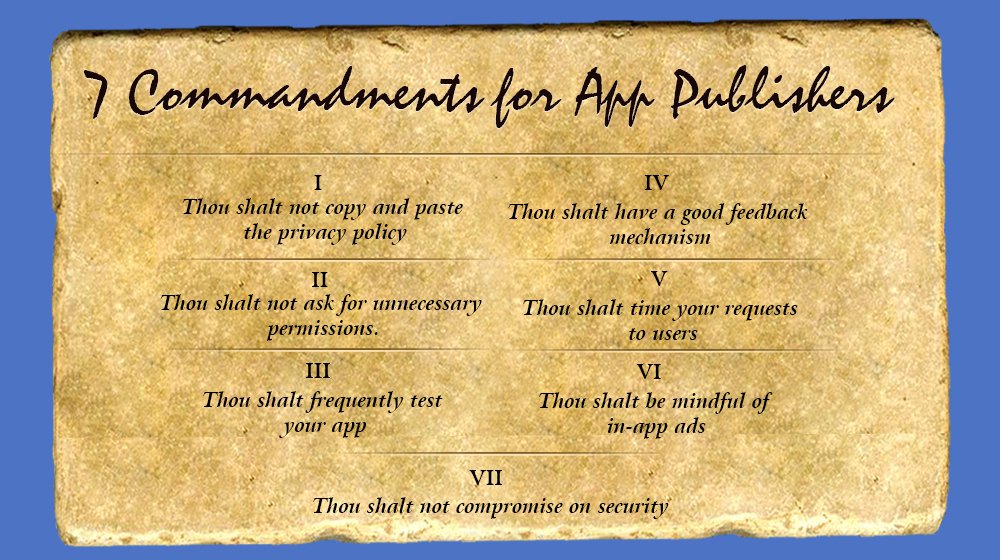
7 Commandments for Mobile App Developers
It is important for mobile app developers to follow the best practices of mobile app development. An app is an experience you provide your users. Every time a user chooses to engage with your app, you need to make sure he has a good experience. All good mobile app developers cover the essential grounds. The best ones follow the 7 commandments given below too. Let’s discuss them.
#1 Thou shalt not copy and paste the privacy policy

Every app is different. The information requirement of every app is different. Therefore it is very important for app publishers to sit down and draft a good privacy policy which is based on the amount of information the app collects from its users and works on. Don’t make the mistake of copying the privacy policy of some other app. For one, it could be very different from your app, serving very different functions and collecting different user info too.
Don’t forget, every piece of user data you collect, you need to have a good reason to do so and you will be required to state that reason in the privacy policy of your app.
#2 Thou shalt not ask for unnecessary permissions

Users get irritated by apps that ask for too many permissions. Usually with Android apps users aren’t given the choice to grant or refuse the permission as they are presented with the declaration of permission. An app screen states its requirements, the features it needs access to, to function efficiently. If you want to install the app your only choice is then to hit ‘accept’, thereby granting the app all access it seeks in your device. Users are not too happy with it. As an app publisher make sure you don’t leave your users vulnerable by having too much access into their device than is absolutely essential. ‘Brightest Flashlight’ app was charged by FTC as it shared user’s location and Device ID without their consent. If you do need access as a developer, it is your duty to be transparent about why you need the permissions.
#3 Thou shalt frequently test your app

It is important that your app is adequately tested internally and by beta testers before it is out on user’s devices. The app needs to be tested on different devices, on different platforms. The app also needs to be tested to confirm that it doesn’t drain away the battery. The app should be tested on different connections. Find out how your app behaves offline. There are several other tests like UI performance testing, other unit tests and more which should be a part of your app development process. Use right mix of devices and device emulators. Go for cloud based mobile application testing if need be. There are several network simulation tools that can help you test your mobile app against different network speeds, connection drop outs and bandwidths limitations. Build, test, check results and build some more. That should be the mantra of a good app development process.
#4 Thou shalt have a good feedback mechanism

Are you listening to your users? Are you listening to what they have to say about your App? You need to provide your users with means to send feedback to you. It could be an email address, actively maintained social media accounts, app store reviews, and more. Heeding to feedback helps you plan better. You know the issues that bother your users from their end. You are then able to push out better updates that handle their concerns. You are able to design and develop the features, your users want to see in your app. Users need to voice their opinions. It is better to know why a user gave you a single star rating in the app store instead of guessing the reasons. The best part is you can address the issues. You cannot provide the solutions unless you know the issues your users have been having. Remember, monitoring tools alone do not provide the complete picture.
#5 Thou shalt time your requests to users

Your users are looking for a good app experience. Uninterrupted and immersive. Don’t ask them for feedback when they are in the midst of the app experience. You don’t want to scare away your users. Sit down and think through. Ask for permissions you absolutely cannot do without. Push notifications are a good tool but ensure you don’t get too pushy with them. If you are looking for feedback, track your users, find out the most opportune moments to send in your feedback requests. Never interrupt them in the middle of a session. Respect their time and the users will then respond favourably.
#6 Thou shalt be mindful of in-app ads

Agree, you need to monetize your app and showing in-app ads is one of the best strategies to do it but you need to be mindful of the types of ads you show your users. Native apps remain your best bet. The 320 x 50 or 300 x 50 pixels banner ads – animated or static are passive and non-intrusive. Use them. Don’t expect clicks from users on in-app video ads unless there is an incentive offered to do so. Users of game apps are different. Rewarded videos or offer walls get impressive engagement as users watch the ads to get the rewards. A recent Unity study reports that 71% of players prefer watching video ads to pay for in-game content.
Make sure the users find the close button on your ads easily. Don’t show the same ads repetitively to the same set of users. Never disturb the users when they are into the exciting bits. Use data to find out the user ‘drop off’ points in your app- where user are more likely to opt out of the app. Use those points to show ads with incentives. In short, make the most of in-app advertisement without irritating your users.
#7 Thou shalt not compromise on security

The responsibility of making the app and the data in it secure squarely falls on the shoulders of app developers. Encryption thus needs to be incorporated into the application well into the file system level. Each operating system is different and the security thus needs to be built in each app accordingly. For devices that get left in cafes and in Taxis, there should be strategy to remotely delete the data of the app so that it doesn’t reach any unauthorized person. App developers would do well to think of other ways to protect data. Programming periodic back-up capability in the apps can help. Data can be routinely archived. There should be a mechanism to identify a ‘suspicious’ login. If the app deals with sensitive data make sure it has a two-factor authentication which will provide added layer of security.

